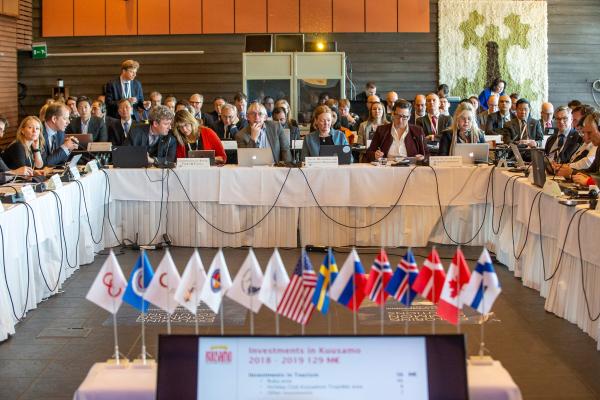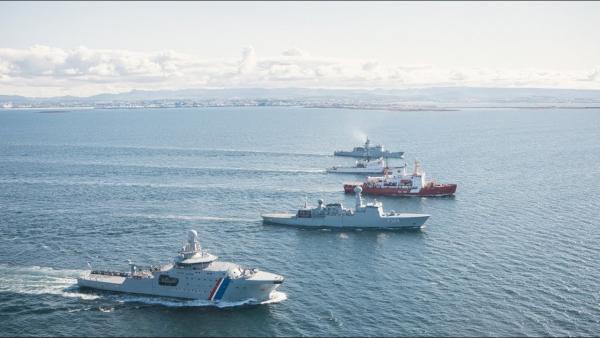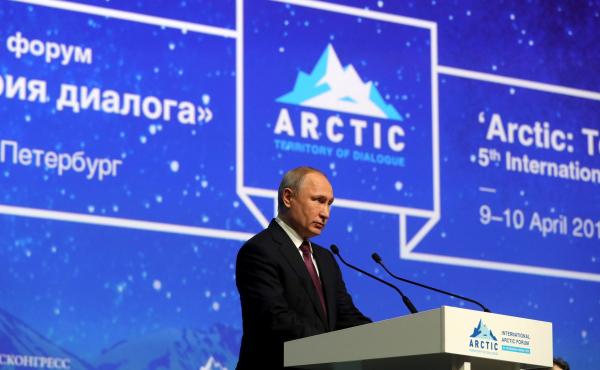Error message
By Andreas Østhagen

Senior Research Fellow, Fridtjof Nansen Institute and High North Center
ao@fni.no
Posted April 23, 2021
The central question in Arctic regional relations over the last decade has been to what degree developments in the north can be insulated from events and relationships elsewhere. If the goal is to keep the Arctic as a separate, “exceptional” region of cooperation, the Arctic states have managed to do a relatively good job, despite setbacks due to the Russian annexation of Crimea in 2014.
The most pressing regional challenge, however, is how to deal with Arctic-specific security concerns, which are often excluded from cooperative forums and venues. As great-power politics has emerged on the agenda in recent years, finding ways to raise security concerns and alleviate pressures—perhaps even develop codes of conduct—has become more urgent.

Debating mechanisms of security cooperation
The debate over what mechanisms are best suited for further expanding security cooperation has now been going on for a decade. Some hold that the Arctic Council should acquire a security component, whereas others look to the Arctic Coast Guard Forum. Both, however, have been deemed unfit or undesirable for this task. There are fears that securitizing the Arctic Council would hamper the positive low-level efforts that have characterized its work since its founding in 1996. The Arctic Coast Guard Forum is similarly focused on practical and operational issues, not on emphasizing high-level security questions and concerns.
The Northern Chiefs of Defense Conference and the Arctic Security Forces Roundtable initiatives were established to this end in 2011–2012, but they fell apart after 2014. The difficulties encountered in trying to establish an arena for security discussions indicate the high sensitivity of these negotiations to events and evolutions elsewhere. Any Arctic security dialogue is fragile and risks being overshadowed by the increasingly tense NATO–Russia relationship in Europe at large. Paradoxically, the aim of such a dialogue— preventing spillover of tensions from other parts of the world to the Arctic—is the very thing that is impeding progress.

Shifting power balances could spur efforts
Analyses focused on relative power do not have to become self-fulfilling prophecies, however. In the Arctic, we can note that China’s increasing global engagement and influence have in fact been rather subdued, at least thus far. Beijing, for all its rhetoric about its interests in a “Polar Silk Route,” has used all the correct Arctic buzzwords about cooperation and restraint, in tune with the preferences of the Arctic states. Shifting power balances and greater Arctic interest from Beijing need not lead to tension and conflict—on the contrary, they might spur efforts to find ways of including non-Arctic actors in regional forums, alleviating the geo-economic concerns of Arctic states.
The other actor that attracts the most attention in Arctic security discussions is of course Russia. As the largest country by far in the circumpolar region and the most ambitious in terms of military investments and activity, Russia sets the parameters for much of the Arctic security trajectory. This is not likely to change, although exactly what the future Arctic security environment will look like depends largely on the West’s response to Russian actions in other regions around the world.
Still, Russian military engagement in the Arctic does not have a uniform regional effect. Even if old bases are revived and new ones built on the country’s northern shoreline and islands, their emphasis would be concentrated in the North Atlantic/Barents Sea portions of the wider circumpolar area.

Neighborly relations
Geographic proximity does play a role. Neighbors, after all, are forced to interact regardless of the positive or negative character of their relations. In turn, centuries of interaction between states form historical patterns that influence relations in specific geographic domains, beyond wide-sweeping generalizations found when discussing “Arctic” security.
Take Norway and Russia in the Barents Sea. The two countries collaborate on everything from dealing with environmental concerns to cultural exchange and border crossings, independent of events elsewhere. At the same time, these relations are not immune to outside developments. The regional upsurge in Arctic attention around 2007–2008, which was due to resource appraisals and Russia’s re-focus northwards, had a positive impact on bilateral relations. In 2010, a new “era” of Russo–Norwegian relations was announced, after various forms of bilateral cooperation had been established as the Cold War receded.
However, bilateral relations are also an invitation to power asymmetry, rivalry, and the tendency of states to revert to power balancing—via alliance systems, for example. Moreover, they are influenced by international events. When events in Ukraine brought about a deterioration in NATO–Russia relations, Norway–Russia relations were negatively affected.
At the same time, bilateral relationships are impacted by regional relations—say, a new agreement signed under Arctic Council auspices—and can in turn impact those same wider relations. A deterioration in bilateral relations between two Arctic Council member states, for example, might make it more difficult to agree on something in the Council.
Case in point: Norwegian–Russian maritime cooperation has led to initiatives in the Arctic Council and other venues. Conversely, the multilateral Arctic Search and Rescue Agreement signed in 2011 has acted as an instigator for further bilateral cooperation between the two countries.
In other words, bilateral and regional relations—especially if they are as delicately balanced as Norway’s relations with Russia—can easily become funnels for issues and dynamics at different levels in international politics. Measures to alleviate concerns and possible rivalries can be taken at the international level—by cooperation, putting agreements in place, or developing joint institutions—thereby fostering greater trust.
Shared economic interest
Despite a growing concern over great-power politics, the current political situation among Arctic states remains positive, underpinned by their shared economic interest in maintaining stable regional relations. Moreover, the maintenance of these positive relations is built on an Arctic community of experts, ranging from diplomats to academics to businesspeople, who constitute the backbone of networks that implicitly or explicitly promote northern cooperation. One important such channel is the variety of annual conferences that have emerged over the past decade, such as Arctic Frontiers, Arctic Circle, and High North Dialogue, which often gather several thousand Arctic experts.
Another channel is the formalized mechanisms that have emerged to grapple with changes in the north. Examples include the 2018 A5+5 agreement on preventing unregulated fishing in the Central Arctic Ocean among the five countries that have Arctic coastlines plus China, Iceland, Japan, South Korea, and the EU, or the Arctic Coast Guard Forum established in 2015. Such agreements and interactions among knowledge-based networks have a socializing effect on the Arctic states, as cooperation becomes the modus operandi for dealing with shared issues.
In their regional relations, we have seen the Arctic states try time and again to avoid externally generated power-balancing behavior and influences. Through regional webs of agreements and collaborative measures, they seek to reduce tension and prevent conflict even if disagreements persist over issues elsewhere.
No quick fix
There is no quick fix for security concerns in the Arctic. The solution is to continue to collaborate on softer issues and to recognize the complex web of arrangements that is Arctic governance. That includes informal networks, annual conferences among Arctic countries, and high-level ministerial meetings every second year, which serve an important function in reducing tension and developing knowledge.
In addition, setting up a regional security forum with an inclusive and broad approach would be a much needed confidence-building measure. Such practical and tangible efforts might in turn benefit not only the Arctic countries but also international affairs more broadly.
The views expressed are those of the author and do not necessarily reflect the policies or positions of the East-West Center or of any other organization.
By Andreas Østhagen

Senior Research Fellow, Fridtjof Nansen Institute and High North Center
ao@fni.no
Posted April 23, 2021
The central question in Arctic regional relations over the last decade has been to what degree developments in the north can be insulated from events and relationships elsewhere. If the goal is to keep the Arctic as a separate, “exceptional” region of cooperation, the Arctic states have managed to do a relatively good job, despite setbacks due to the Russian annexation of Crimea in 2014.
The most pressing regional challenge, however, is how to deal with Arctic-specific security concerns, which are often excluded from cooperative forums and venues. As great-power politics has emerged on the agenda in recent years, finding ways to raise security concerns and alleviate pressures—perhaps even develop codes of conduct—has become more urgent.

Debating mechanisms of security cooperation
The debate over what mechanisms are best suited for further expanding security cooperation has now been going on for a decade. Some hold that the Arctic Council should acquire a security component, whereas others look to the Arctic Coast Guard Forum. Both, however, have been deemed unfit or undesirable for this task. There are fears that securitizing the Arctic Council would hamper the positive low-level efforts that have characterized its work since its founding in 1996. The Arctic Coast Guard Forum is similarly focused on practical and operational issues, not on emphasizing high-level security questions and concerns.
The Northern Chiefs of Defense Conference and the Arctic Security Forces Roundtable initiatives were established to this end in 2011–2012, but they fell apart after 2014. The difficulties encountered in trying to establish an arena for security discussions indicate the high sensitivity of these negotiations to events and evolutions elsewhere. Any Arctic security dialogue is fragile and risks being overshadowed by the increasingly tense NATO–Russia relationship in Europe at large. Paradoxically, the aim of such a dialogue— preventing spillover of tensions from other parts of the world to the Arctic—is the very thing that is impeding progress.

Shifting power balances could spur efforts
Analyses focused on relative power do not have to become self-fulfilling prophecies, however. In the Arctic, we can note that China’s increasing global engagement and influence have in fact been rather subdued, at least thus far. Beijing, for all its rhetoric about its interests in a “Polar Silk Route,” has used all the correct Arctic buzzwords about cooperation and restraint, in tune with the preferences of the Arctic states. Shifting power balances and greater Arctic interest from Beijing need not lead to tension and conflict—on the contrary, they might spur efforts to find ways of including non-Arctic actors in regional forums, alleviating the geo-economic concerns of Arctic states.
The other actor that attracts the most attention in Arctic security discussions is of course Russia. As the largest country by far in the circumpolar region and the most ambitious in terms of military investments and activity, Russia sets the parameters for much of the Arctic security trajectory. This is not likely to change, although exactly what the future Arctic security environment will look like depends largely on the West’s response to Russian actions in other regions around the world.
Still, Russian military engagement in the Arctic does not have a uniform regional effect. Even if old bases are revived and new ones built on the country’s northern shoreline and islands, their emphasis would be concentrated in the North Atlantic/Barents Sea portions of the wider circumpolar area.

Neighborly relations
Geographic proximity does play a role. Neighbors, after all, are forced to interact regardless of the positive or negative character of their relations. In turn, centuries of interaction between states form historical patterns that influence relations in specific geographic domains, beyond wide-sweeping generalizations found when discussing “Arctic” security.
Take Norway and Russia in the Barents Sea. The two countries collaborate on everything from dealing with environmental concerns to cultural exchange and border crossings, independent of events elsewhere. At the same time, these relations are not immune to outside developments. The regional upsurge in Arctic attention around 2007–2008, which was due to resource appraisals and Russia’s re-focus northwards, had a positive impact on bilateral relations. In 2010, a new “era” of Russo–Norwegian relations was announced, after various forms of bilateral cooperation had been established as the Cold War receded.
However, bilateral relations are also an invitation to power asymmetry, rivalry, and the tendency of states to revert to power balancing—via alliance systems, for example. Moreover, they are influenced by international events. When events in Ukraine brought about a deterioration in NATO–Russia relations, Norway–Russia relations were negatively affected.
At the same time, bilateral relationships are impacted by regional relations—say, a new agreement signed under Arctic Council auspices—and can in turn impact those same wider relations. A deterioration in bilateral relations between two Arctic Council member states, for example, might make it more difficult to agree on something in the Council.
Case in point: Norwegian–Russian maritime cooperation has led to initiatives in the Arctic Council and other venues. Conversely, the multilateral Arctic Search and Rescue Agreement signed in 2011 has acted as an instigator for further bilateral cooperation between the two countries.
In other words, bilateral and regional relations—especially if they are as delicately balanced as Norway’s relations with Russia—can easily become funnels for issues and dynamics at different levels in international politics. Measures to alleviate concerns and possible rivalries can be taken at the international level—by cooperation, putting agreements in place, or developing joint institutions—thereby fostering greater trust.
Shared economic interest
Despite a growing concern over great-power politics, the current political situation among Arctic states remains positive, underpinned by their shared economic interest in maintaining stable regional relations. Moreover, the maintenance of these positive relations is built on an Arctic community of experts, ranging from diplomats to academics to businesspeople, who constitute the backbone of networks that implicitly or explicitly promote northern cooperation. One important such channel is the variety of annual conferences that have emerged over the past decade, such as Arctic Frontiers, Arctic Circle, and High North Dialogue, which often gather several thousand Arctic experts.
Another channel is the formalized mechanisms that have emerged to grapple with changes in the north. Examples include the 2018 A5+5 agreement on preventing unregulated fishing in the Central Arctic Ocean among the five countries that have Arctic coastlines plus China, Iceland, Japan, South Korea, and the EU, or the Arctic Coast Guard Forum established in 2015. Such agreements and interactions among knowledge-based networks have a socializing effect on the Arctic states, as cooperation becomes the modus operandi for dealing with shared issues.
In their regional relations, we have seen the Arctic states try time and again to avoid externally generated power-balancing behavior and influences. Through regional webs of agreements and collaborative measures, they seek to reduce tension and prevent conflict even if disagreements persist over issues elsewhere.
No quick fix
There is no quick fix for security concerns in the Arctic. The solution is to continue to collaborate on softer issues and to recognize the complex web of arrangements that is Arctic governance. That includes informal networks, annual conferences among Arctic countries, and high-level ministerial meetings every second year, which serve an important function in reducing tension and developing knowledge.
In addition, setting up a regional security forum with an inclusive and broad approach would be a much needed confidence-building measure. Such practical and tangible efforts might in turn benefit not only the Arctic countries but also international affairs more broadly.
The views expressed are those of the author and do not necessarily reflect the policies or positions of the East-West Center or of any other organization.

